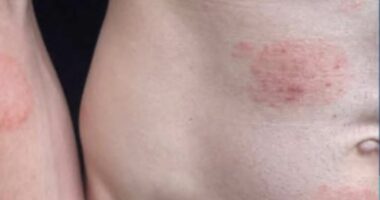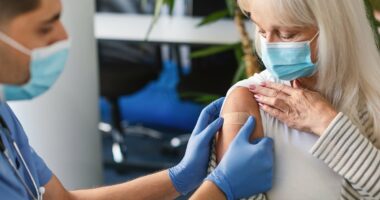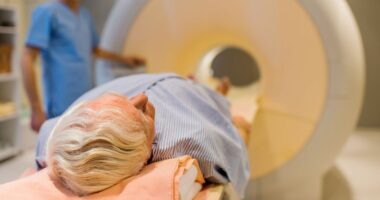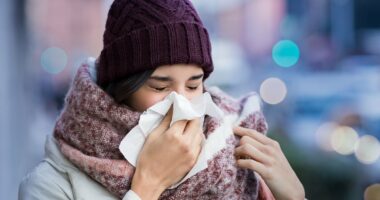Share this @internewscast.com
Women’s hormones can be temperamental throughout life and some suffer more than others, but even hundreds of years ago herbal supplements were used to ease ailments and help with an array of ‘female problems’.
From painful periods to potential pregnancy – or perhaps infertility, followed by perimenopause and the menopause (when periods stop), some would say ladies get a tough deal.
Interestingly some cultures embrace the menopause more than others – and Japanese women even celebrate it, they also reportedly have less symptoms which could be down to a different diet.
Some women yearn for a baby, but never fall pregnant – and this is often due to hormone imbalances.
On the other hand, those that do give birth may find their hormones fluctuating afterwards, due to a sharp drop in female hormones estrogen and progesterone.
These two, oestrogen and progesterone are perhaps the main culprits when it comes to mood swings – and deeper issues such as fertility.
However, there are many more hormones at play – oxytocin, beta-endorphins, and prolactin are perhaps lesser known in the endocrine system.
The balance of follicle-stimulating hormone (FSH), and luteinizing hormone (LH) are crucial for fertility – but women also produce testosterone (known more as a male’s hormone).
Thyroid hormones are very influential when it comes to a woman’s menstrual cycle, so as you can see, it’s an extremely complex picture.
These days of course many women are able to opt for a blood test privately – or at their doctors – if they feel concerned.
It helps to know what, if any, imbalance you may have as this will vary from person to person, but there are a few popular supplements that many women swear by – so help may be at hand.
Sage
Let’s start with sage, the herb that you can buy in tablet form, as a tea or just use in abundance as a fresh herb – this is said to help with hot flushes during menopausal symptoms.
Concentrated sage (tablets) are said to be best avoided during pregnancy, it can be unsafe to consume at this time, this herb’s phytoestrogenic properties mimic estrogen in the body, so it’s useful for night sweats and hot flushes.
Thyme
The herb thyme works in a different way, but just as potently, there have been studies into the essential oil of thyme and its effect on progesterone – and it’s believed to balance this hormone.
Dr. Josh Axe, who created the website Dr Axe, reported online: “Thyme oil benefits the body by improving progesterone production.
“Both men and a lot of women are low in progesterone, and low progesterone levels have been linked with infertility, PCOS and depression, as well as other imbalanced hormones within the body.”
Soy
Another rich phytoestrogen source is soy, either soya milk or soy sauce – and it’s thought this could be why women in Japan for example seemingly ‘dodge’ many of the harrowing menopause symptoms.
Soy and soy isoflavones could also be beneficial for fertility, some studies suggest, if eaten in moderation as part of a balanced diet.
National Institutes of Health (NIH) concluded in a study: “Soy isoflavones have repeatedly shown a mild estrogenic effect but at high concentrations they may have enough power to act on hypothalamus and pituitary gland, reducing the ovarian synthesis of estrogens.”
However they did outline that it varies from person to person, due to everyone’s endocrine (hormonal) system behaving differently in the first place.
Wild yam
Wild yam which can be eaten as a vegetable or taken as a tablet, but also comes in the form of a cream is said to mimic estrogen and progesterone.
Studies into wild yam show no proof that it ‘works’ however, hundreds of online reviews on the product by users of the cream in particular hail as being effective.
Chasteberry
Agnus Castus (also known as vitex or chasteberry) is said to be a good aid for fertility, generally taken orally – and research has shown it could improve ovulation and regulate menses by reducing elevated prolactin levels.
Website Baby Centre reports: “The herb has been shown to help raise progesterone levels and lower prolactin levels, both of which may help with fertility in some women.
“A review of 43 studies published from 1997 to 2016 concluded that Vitex agnus-castus is beneficial in treating infertility disorder in both men and women (as well as the treatment of PMS).
“The researchers hypothesized that chemical compounds in the plant influence the pituitary gland, which in turn decrease prolactin.
“Decreased prolactin can affect the levels of follicle-stimulating hormones (FSH) as well as estrogen in women and testosterone in men.”
Lady’s mantle
Lady’s mantle is a herb that women have been using perhaps since time began and known as a ‘woman’s best friend’.
It’s used to support fertility as it’s believed to strengthen the uterus even regulating periods – and helping with blood circulation, some women use it after childbirth or a miscarriage for this reason.
Red Clover
Red Clover, as a tea or tablet is thought to mimic estrogen, helping with hot flashes and hormonal changes, but because of this estrogen-like effect, it’s best avoided during pregnancy or when breast-feeding.
Black cohosh
Black cohosh has also been detailed as a helpful supplement during menopause or peri menopause, for hot flushes, but again, its effects vary greatly.
Green tea
Green tea contains B vitamins and natural folic acid, therefore it can also be helpful for women at any stage of their life, but best to consume in moderation.
Evening primrose oil
Last but not least, evening primrose oil has been shown to enhance outcomes for women’s hormone-related issues, but it’s thought to be down to the high levels of omega 6 and omega 3 oil in the product.
While no firm research proves that evening primrose does help women with infertility or menopausal symptoms, many swear by it in reviews online, but similarly with any of these supplements, if it feels like it works, then it works for you.
Importantly, no matter what hormonal stage you are at, a balanced diet, exercise and generally taking care of your overall health is perhaps the most beneficial thing women of any age can do.
















